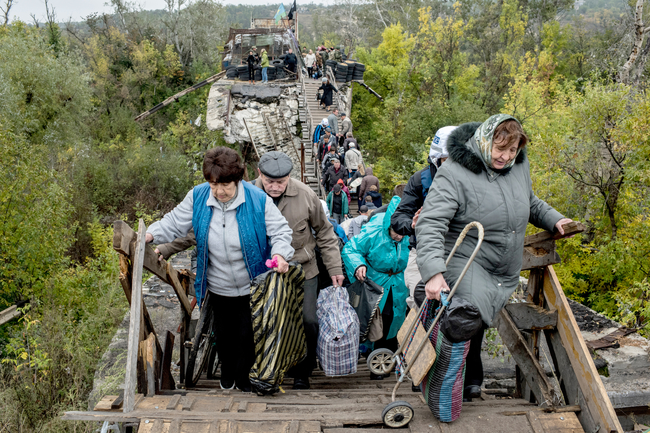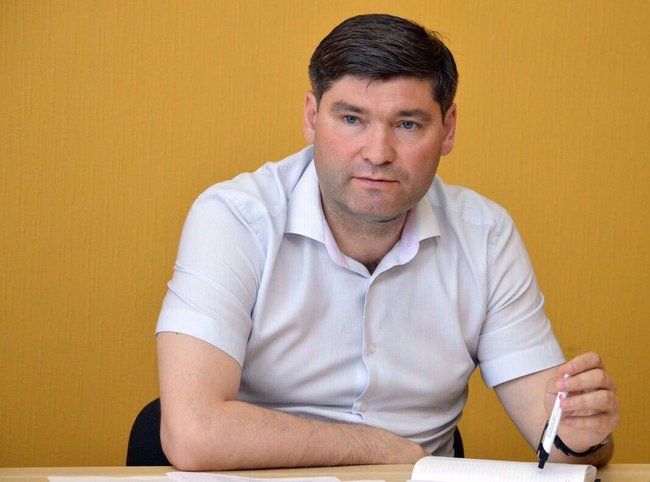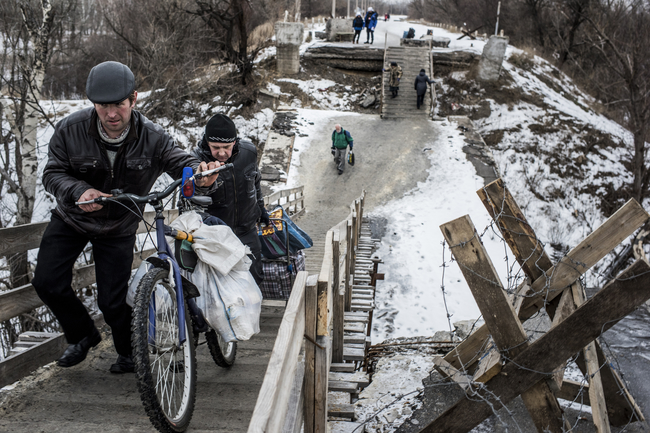A “riddled” Luhansk region
Yurii KLYMENKO: “We are prepared for any measures aimed at a peaceful settlement of the conflict, but not at the cost of the life of Ukrainians and our sovereignty”
Riddled with shells and pain, the Luhansk region is for the fourth consecutive year in a permanent state of war, accounting for the greater part of the line of disengagement and the border with Russia. While Donetsk oblast was always considered richer than its neighbor, Luhansk oblast, Ukraine’s eastern gate, seemed to be left aside. The pro-Russian forces held sway here for a long time. The oblast, as well all the Donbas, was placed under full control of certain clans and “barons.” The Ukrainians are still reaping the fruits of this policy. We can see now that the pro-Russian forces are rearing their heads – sometimes covertly, sometimes overtly. Some decided to cooperate with the investigation and were given condonation, some prefer to lie low for the time being. But what can you expect from the east, if rather ambiguous calls are ringing out even in Kyiv?
In these conditions, Luhansk region security is not just a topical but a crying issue – especially if you take into account regular reports from not only the ATO headquarters, but also the police press center.
The talk about reintegration of the occupied territories without a clear strategy of deoccupation and detoxification of brains in the entire region (not only in the “LNR” or the “DNR”) remains a demagogy in parliament and TV studios. Militants do not intend to make concessions. For it is too comfortable to keep people terrified in Luhansk, Dovzhansk (Sverdlovsk), Rovenky, Alchevsk, Stakhanov, Krasnyi Luch, and wield almost unbounded power backed by the Kremlin. And because of the populism of many politicians, the scourge of our parliamentarianism and bureaucracy, the search for a constructive option is being lost among endless calls – from the ones that border on collaboration to the ones that are too radical.
The Day discussed these and other problems with Yurii KLYMENKO, Deputy Chairman of the Luhansk Oblast Military-Civilian Administration for Security and Public Order.
“WE NEED AUTHORITATIVE LUHANSK-BORN PEOPLE WHO ARE ABLE NOT TO DEEPEN THE RIFT IN THE REGION”
Mr. Klymenko, there is so much talk now about reintegration of the occupied areas, but very little is being said about deoccupation. This looks somewhat strange, especially against the backdrop of Kyiv’s obviously inconsistent policies. What is your vision of the process of reintegration?

“The draft law on reintegration is based on, among other things, the opinions of the populace and officials in Luhansk and Donetsk oblasts, their observations and knowledge of the eastern regions’ particularities. Yet I can’t say to what extent these opinions were taken into account there. Luhansk oblast is often visited by members of various parliamentary committees, who meet the communities and go to the line of disengagement. For example, the budget committee came to visit us recently. Then we received MPs from different factions, who drove along the entire line of disengagement. In other words, ‘the upper echelons’ seem to be paying attention to the regions’ problems.”
It often happened that ordinary people come across difficulties on the line of disengagement. Crossing this line is sometimes a hell for them. Is any work being done with people in the key junctions of communication between the occupied and the free territories? Russia once suggested that Ukrainians on the occupied territories fill out special forms to complain against Ukraine for allegedly shooting at them. This means they are trying very hard to influence our citizens.
“We don’t have this kind of examples. We do not force anybody to fill out something. We constantly keep the process of regaining our lands under control, but not everything depends on us personally. We are making efforts in various directions. We still maintain communication at the level of teachers and students. Nobody is cutting off these threads of contact between the free and the occupied territories. In general, such disruptions are very painful to the grassroots. Now we are establishing contacts at the level of entrepreneurs – between industrialists and agrarians. But please do not confuse this with collaborationism. We need authoritative Luhansk-born people who are able to contact at an adequate level in order not to deepen the rift which it will be rather difficult to heal. We share the same goal – to knit together the unitary state of Ukraine which some people are deliberately trying to tear apart.”
The question of the disengagement of means and forces at the checkpoint Stanytsia Luhanska has been suspended for a year or so. As far as I know, there were very many difficulties and unnoticed dangers there. What is the current situation?
“To begin with, under the Minsk Agreements, the main condition for the disengagement of means and forces is unconditional observation of a seven-day ceasefire by both sides. However, the disengagement in the vicinity of Stanytsia Luhanska did not start due to systematic violations of ‘silence’ by the militants and Russian regular army units. The recorded violations are being timely reported to the Joint Center of Ceasefire Control and Coordination on the disengagement line as well as observers from the OSCE and other international organizations. This has demonstrated again unwillingness of the opposite side to meet its commitments. Hence is the conclusion: as long as there is no peace, there will be no disengagement. We cannot expose Ukrainian civilians to danger or weaken our positions. We are prepared for any measures aimed at a peaceful settlement of the conflict, but not at the cost of the life of Ukrainians and our sovereignty.”
What is now the situation at the checkpoint?
“Since October 3, 2015, there has been the only checkpoint, ‘Luhansk – Stanytsia Luhanska – Novoaidar,’ on the territory of Luhansk oblast, which only functions as pedestrian because a bridge across the river Siverskyi Donets was damaged. The bridge’s state of repair does not allow organizing transport communication and delivery of goods, including international humanitarian relief, to those who live on the non-controlled territory. Besides, when the checkpoint was being set up, it was supposed to handle about 1,000-1,500 people a day, but it is 9,500-10,500 today. Can you imagine the load? It would be possible to relieve Stanytsia by opening a checkpoint in Zolote, but militants are doing their best to prevent the already prepared point from opening. Therefore, the pedestrian passage in Stanytsia Luhanska is heavily overloaded.
“What arouses special concern is the fact that the condition of the ruined bridge’s wooden section has essentially worsened. A wooden support beam 2.5 meters from the bridge’s main frame is almost completely ruined. As a result, the bridge is sagging a lot and becomes unstable when the beam is under load. It is dangerous. There have been instances when pedestrians were losing equilibrium and falling. We are also worried about the difficulty for elderly and handicapped persons to move.
“Let me note one little-spoken-of detail. Terrorists have relocated their checkpoint across the disengagement line, which is defined as one that passes along the riverbed of Siverskyi Donets, onto the territory controlled by the Ukrainian authorities. In other words, the invader has in fact consolidated his position on our bank, using civilians as a cover. As a result, the oblast’s administration cannot begin emergency work to reinforce bridge structures. Besides, in spite of assurances from militants and their Russian masters, no national or international organizations were allowed to monitor the reconstruction of the bridge. This means that militants have put up artificial obstacles to crossing the line of disengagement.”
“IT IS NECESSARY TO MAINTAIN RELATIONS WITH ALL RESIDENTS OF LUHANSK OBLAST IF THEY ARE NOT CRIMINALS”
Is there an impression that politicians sometimes confuse a normal sound-minded dialog with people on the occupied territories and collaborationism?
“Yes, of course. And it is very sad, for this approach spoils the game. Sometimes even outright fakes are spread supposedly on my behalf. I have to deny them. Or, for example, a rumor was circulated recently about the performance of a Svatove artistic group on the occupied territory. It is complete nonsense. But people read it and think that our artists perform for the invader. There are all kinds of experts who take their conjectures God knows from where, but the media transmit them. This causes a stir that only harms because when any other statement gets into this erroneous matrix, it will be interpreted equally erroneously.”

Photo by Yevhen MALOLIETKA
Let us take Luhansk residents in general. There are many people among them who decided to ostensibly collaborate with invaders quite against their own will. They are, particularly, civil servants, doctors, firemen, etc.
“It is necessary to maintain relations with all residents of Luhansk oblast if they are not criminals. This requires a fair approach. A criminal must be aware of inevitable punishment, while an ordinary individual, who had to maintain some relations with the occupiers against his own will, must, on the contrary, be aware of protection by the state. For him, it is perhaps the last hope to get back to normal life. There are people who opted for cooperation with the occupier not in the literal sense of this word, as many interpret it. Not all are aware of all the conditions these people are in – they would be glad to meet Ukraine if they had this opportunity. One must not cast slurs on everybody indiscriminately and measure everybody by the same yardstick. Sick parents, small children, absence of residence or a job – many suddenly had to shoulder this onerous burden. They need to be helped, not harassed. We should not repeat the mistakes some of us committed at the beginning of the war, dubbing people as ‘vatniks’ or ‘Banderaites.’ People on the occupied territory are now exposed to Russian propaganda 24 hours a day. This particularly deforms children who are told about the allegedly ‘primordial Russian lands’ seized by Ukraine, while the Russians came and helped liberated them from the ‘junta.’ I emphasize that this is being implanted in children’s minds. If we pursue a policy of separation from our lands and our compatriots, we will only be helping Russian propaganda. We must take on responsibility and admit at last that Ukraine failed to do something in good time to protect these territories from the invader. And one of the main factors in this case is granting Ukrainian education to children from the occupied territory. They must be torn from the grip of Russian propaganda at this stage of the formation of their personalities.”
“IN THE CONDITIONS OF A HYBRID WAR, RUSSIA CAN EXERT PRESSURE ON UKRAINIAN OFFICIALS BY WAY OF BRIBERY, BLACKMAIL, AND RECRUITING”
It sometimes happens that you switch on a TV and think: is it worthwhile to switch it on? On the one hand, we are speaking about the reintegration of our territories, but, on the other, we see quarrels between politicians, pseudo-Maidans, fist fights, and acts of terror. And while the blame for terrorist acts lies with Russian saboteurs, how can we explain to our citizens that some central TV channels are beaming veiled Russian propaganda? How can we explain the picture of disorder created by irresponsible politicians and sometimes by the officials who never took off the mantle of a politician?
“I agree with you – I am also unwilling sometimes to switch on the TV set. Naturally, we live in a free country, but let us not be naive, especially against the backdrop of almost daily reports about murders and systematic terrorist acts in a free country. Undoubtedly, a great deal of responsibility also lies with journalists, not only with politicians. The impression is that, to fill the time slot, TV channels invite anybody who fell into their hands. They thus hype up dubious experts who not only are unable to make a professional analysis but just have no information. We should not forget that it is the mass media that project a certain image of Ukraine as a whole on the occupied territory. This adds to the already existing disinformation and propaganda. What discredits Ukraine very much is what is going on near the Verkhovna Rada, for this is presented as not commonplace pickets but as a third Maidan. Things seems to be calming down now, but other, not quite clear to many, conflicts are erupting. As a matter of fact, people need peace and confidence in tomorrow, but, instead, Kyiv offers them endless upheavals. At least, it looks so from the TV screen.”
What do you think about the likely ban for governmental officials to visit Russia?
“The Security Service of Ukraine (SBU) is consistently drawing up proposals to improve the current law in order to effectively resist the ‘hybrid war’ the Kremlin unleashed against Ukraine. This process is not simple and has a lot of details that may have various consequences in the future. In the past two years, the SBU has proposed a number of changes to about 30 legislative documents in order to increase the level of national security and terrorism control in the conditions of Russian aggression. The ban on the travels of politicians and officials to Russia is another step to streamline resistance to Russian aggression in legal terms. The proposed ban is applicable to the President, the chief of his staff and his deputies, members of the government, the chairman and members of the National Television and Radio Board, the Antimonopoly Committee, the National Agency for the Prevention of Corruption, the Auditing Chamber, the Central Election Committee, the secretary of the National Security and Defense Council and his deputies, the management of the State Television and Radio Committee and the State Property Fund, and members of parliament. It is also proposed to introduce Russia travel restrictions for National Bank employees, local councilors, judges, and public prosecutors. I personally take a positive attitude to this because, in the conditions of a hybrid war, the aggressor country can exert pressure on such persons through its special services by way of bribery, blackmail, or recruiting for anti-state activity. This kind of persons can be kidnapped, tortured, imprisoned, or even deprived of life. In such cases, Ukraine cannot ensure the protection of their rights. Therefore, the passage of this bill will make it possible to neutralize the aggressor country’s influence on the citizens of Ukraine, who are civil servants, which is of paramount importance for the functioning of our state.”
Newspaper output №:
№71, (2017)Section
Day After Day





